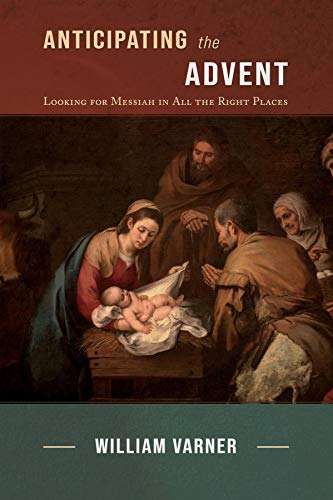An Author Interview from Books At a Glance
Concise Version—Subscribe for More!
Greetings, I’m Fred G. Zaspel, and welcome to another Author Interview here at Books At a Glance.
Christmas is fast-approaching, and with that in mind today we are talking to Dr. William Varner about his excellent new book, Anticipating the Advent: Looking for Messiah in All the Right Places.
Will, welcome, and congratulations on your new book!
Varner:
Thank you very much; it is a real honor for me to be here.
Zaspel:
Tell us what your book is all about and what you hope to accomplish.
Varner:
The book encourages readers to look at the Messianic prophecies to find the anticipation of Advent in Scripture. There are other places people look, but I am, of course, tipping my hand in the interpretive direction of looking in the right place, the Messianic prophecies themselves.
Zaspel:
Just what is the “dark side” of Christmas that is so important for us to understand the Christmas event?
Varner:
The “dark side” of Christmas refers to the dark events related to Christmas, e.g., how the king just north of where Christ was born wanted to kill him. It is important to consider the “dark side” of these events because although we want to sing “silent night,” there were many awful things that happened during that time.
Zaspel:
Paul speaks of the coming of Christ as he coming into this world to save sinners.
Varner:
The light of the world came into the darkness, and we need to remember the darkness of the world.
Zaspel:
I think every Christian is fascinated with Old Testament prophecies of the coming of Jesus, and that’s what you take up in the first part of your book. Give us an overview of what you do here, and maybe some samplings of the prophecies you examine.
Varner:
If we begin canonically, Genesis 3:15 refers to Christ as a Messianic prophecy that is referred to in Psalm 110 and Romans 16. Sometimes Roman Catholics portray it as Mary crushing the head of the serpent, but Christ is the one who did it. I thought about portraying this image in the book itself, with a serpent around my own heel, but my wife encouraged me otherwise. In essence, Christ came to do battle in this world. That is part of the reason why he is referred to as the lion of Judah. There are more similar references in Revelation, e.g., the lamb and the lion. Balaam’s speeches in Numbers refers to Christ as a star and scepter. Micah 5:2 also refers to the eternality of prophecies referring to the Messiah.
Zaspel:
In part 2 of your book you highlight events in the birth and infancy narratives from Matthew and Luke. Give us a sample or two of what might be some not-so-well-known details, and give us a taste of your myth-busting also.
Varner:
Some of the myths that need busting come from references to the Magi. For example, some of the traditions go so far as to provide their names, but Matthew 2 does not provide any names. Sometimes they are portrayed as white and others as black. Because they are from the east, it is highly unlikely that anyone was black. The Magi came to a house, not a stable. The child Jesus is not an infant but an older child. Although I am not trying to bust myths for its own sake, I am trying to get people to look closely at the biblical text.
Zaspel:
What did the Jews of Jesus’ day – or of today, for that matter – believe about the Messiah? And give us a biblical overview of what he would be like.
Varner:
The Jews saw Jesus as a coming king primarily, not so much as in his other biblically known roles. They could not handle Jesus as a king dying on the cross because they so desired a king. His crucifixion did not fit their understanding of Scripture, but Jesus pointed out all that the prophets spoke about the necessity of the suffering of the Messiah. The Jews were under the thumb of foreign rulers, Rome and other countries, made them strongly desire the kingship of the Messiah. But they had to learn that the Messiah had to suffer first. Suffering had to come before the glory.
Zaspel:
Christ established his kingdom by his death, and the Jews did not see that.
Varner:
Absolutely.
Zaspel:
Who is your intended audience for this book?
Varner:
Before I answer that question, all the royalties of this book go to Bible translation efforts. And I am thrilled that Masters Seminary has ordered 1,300 copies to give away.
This book is for a variety of people. First, it is for unsaved people, though it is not a very simple presentation. But the gospel is there for unbelievers to see. Second, the book is intended to educate Christians about the Messianic roots of their faith. I have a heart for helping Christians see that and for Jews, as I have served in Jewish missions.
Zaspel:
We’re talking to Dr. William Varner about his new book, Anticipating the Advent: Looking for Messiah in All the Right Places. It’s a helpful and informed introduction to a massive and wonderful biblical theme, and we encourage you to purchase a copy to read especially during the holidays.
Will, thanks for your faithful work, and thanks for talking to us today.
Varner:
Thanks, Fred, for having me, and may the Lord use this book for his glory!

